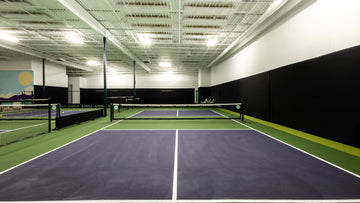
Title: Understanding the Impact of Varying Thicknesses in Pickleball Paddles
Pickleball, a sport known for its accessibility and fast-paced gameplay, has been gaining popularity across all age groups. As players become more serious about their game, they start paying attention to the equipment they use, particularly the paddle. One crucial factor that often gets overlooked is the thickness of the paddle. However, understanding the implications of varying thicknesses can significantly impact your performance on the court.
So, let's delve into the world of pickleball paddles and explore how thickness affects gameplay:
1. Control vs. Power:
- Thicker paddles typically provide more power due to their larger sweet spot and increased weight. This extra power can be advantageous for players who rely on strong, aggressive shots to dominate the game.
- Conversely, thinner paddles offer better control and maneuverability. They allow for more finesse shots, precise placement, and quick reactions, which can be beneficial for players who prioritize accuracy over power.
2. Response and Feel:
- The thickness of a paddle directly influences its response and feel upon contact with the ball. Thicker paddles tend to provide a solid, consistent feel, offering stability and predictability during shots.
- Thinner paddles, on the other hand, offer a softer, more responsive feel. They allow players to feel the ball better on the paddle face, which can lead to improved touch and placement shots.
3. Comfort and Fatigue:
- Thicker paddles often have more cushioning, which can help reduce vibration and discomfort upon impact. This added comfort can be beneficial during long matches or intense rallies, as it reduces the risk of fatigue and injury.
- Thinner paddles, while lighter and more maneuverable, may transmit more shock to the player's arm during hard hits, potentially leading to fatigue or discomfort over time.
4. Durability:
- Generally, thicker paddles tend to be more durable due to their sturdier construction. The additional material provides extra reinforcement against impacts, making them less prone to damage or wear and tear.
- Thinner paddles, while lighter and more agile, may be more susceptible to dings, chips, or cracks, especially if subjected to aggressive play or frequent mishits.
5. Personal Preference:
- Ultimately, the choice between thick and thin paddles comes down to personal preference and playing style. Some players may prefer the added power and stability of thicker paddles, while others may prioritize the agility and control offered by thinner ones.
- It's essential for players to experiment with different paddle thicknesses to find what works best for their individual needs, playing style, and skill level.
In conclusion, the thickness of a pickleball paddle plays a significant role in determining its performance characteristics on the court. Whether you prioritize power, control, comfort, or durability, understanding how varying thicknesses impact gameplay can help you make informed decisions when selecting your paddle. So, next time you're in the market for a new paddle, consider the thickness carefully, and choose one that complements your playing style and preferences. Now let's go play some PIX!
Pickleball, a sport known for its accessibility and fast-paced gameplay, has been gaining popularity across all age groups. As players become more serious about their game, they start paying attention to the equipment they use, particularly the paddle. One crucial factor that often gets overlooked is the thickness of the paddle. However, understanding the implications of varying thicknesses can significantly impact your performance on the court.
So, let's delve into the world of pickleball paddles and explore how thickness affects gameplay:
1. Control vs. Power:
- Thicker paddles typically provide more power due to their larger sweet spot and increased weight. This extra power can be advantageous for players who rely on strong, aggressive shots to dominate the game.
- Conversely, thinner paddles offer better control and maneuverability. They allow for more finesse shots, precise placement, and quick reactions, which can be beneficial for players who prioritize accuracy over power.
2. Response and Feel:
- The thickness of a paddle directly influences its response and feel upon contact with the ball. Thicker paddles tend to provide a solid, consistent feel, offering stability and predictability during shots.
- Thinner paddles, on the other hand, offer a softer, more responsive feel. They allow players to feel the ball better on the paddle face, which can lead to improved touch and placement shots.
3. Comfort and Fatigue:
- Thicker paddles often have more cushioning, which can help reduce vibration and discomfort upon impact. This added comfort can be beneficial during long matches or intense rallies, as it reduces the risk of fatigue and injury.
- Thinner paddles, while lighter and more maneuverable, may transmit more shock to the player's arm during hard hits, potentially leading to fatigue or discomfort over time.
4. Durability:
- Generally, thicker paddles tend to be more durable due to their sturdier construction. The additional material provides extra reinforcement against impacts, making them less prone to damage or wear and tear.
- Thinner paddles, while lighter and more agile, may be more susceptible to dings, chips, or cracks, especially if subjected to aggressive play or frequent mishits.
5. Personal Preference:
- Ultimately, the choice between thick and thin paddles comes down to personal preference and playing style. Some players may prefer the added power and stability of thicker paddles, while others may prioritize the agility and control offered by thinner ones.
- It's essential for players to experiment with different paddle thicknesses to find what works best for their individual needs, playing style, and skill level.
In conclusion, the thickness of a pickleball paddle plays a significant role in determining its performance characteristics on the court. Whether you prioritize power, control, comfort, or durability, understanding how varying thicknesses impact gameplay can help you make informed decisions when selecting your paddle. So, next time you're in the market for a new paddle, consider the thickness carefully, and choose one that complements your playing style and preferences. Now let's go play some PIX!




